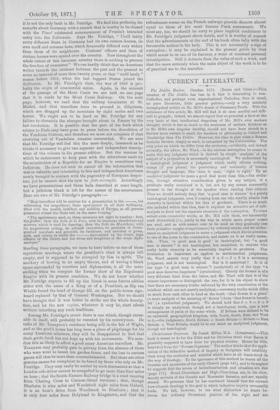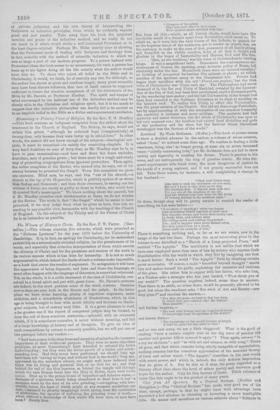Christiaman Orgaman, By Josiah Miller, M.A. (Longmans).—This book is meant
to do for the Bible and for Christian truth what Bacon is generally supposed to have done for physical science. Hence its title, borrowed from the 1' Novum Organum." The author thinks that the appli- cation of the inductive method of inquiry to Scripture will infallibly clear away the confusion and unbelief which have at all times stood in the way of theology. To the ignorance of this method ho traces all the heresies and apostasies of the early Church (pogo 145), and to its neglect he suggests that the errors of latitudinarianism and ritualism are due (page 171). Broad-Churohism and High-Churchism aro, iu his view, merely revivals of the Gnostic and Montaniat heresies, and are equally absurd. We presume that ho has convinced himself that the current Low-Church theology is the goal to which inductive inquiry necessarily leads. We fail, however, to see what distinction he draws be- tween the ordinary Protestant position of the right and use of private judgment, and his own tlaoory of interpreting the Scriptures on inductive principles, from which ho evidently expects great and now results. Take away from his book the perpetual mention and praise of the inductive method, and we really do not 800 mach in it which would strike a well-instructed Protestant as in the least degree original. Perhaps Mr. Miller merely aims at showing that the Protestant mode of dealing with Scripture and theology does, in fact, coincide with the method of scientific induction to which wo owe so largo a part of our modern progress. To a person imbued with Protestant ideas, the book seems to us unnecessary, for such a person has been up to his lights doing all his life exactly what the author would have him do. To those who reject all belief in the Bible and in Christianity, it would, we think, be of scarcely any use, for although, as the author has shown at groat and needless length, many groat scientific mon have been sincere believers, that fact of itself cannot be supposed sufficient to insure the absolute acceptance of all the statements of the Bible by Mr. Darwin or Professor Huxley. The spirit and temper of mind encouraged by the habitual use of the inductive method may be olosely akin to the Christian and religious spirit, but it is too much to suggest that the inductive philosopher can hardly fail to be carried on to an implicit belief in the Bible as a divine and supernatural revelation.



































 Previous page
Previous page